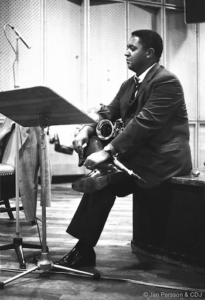
Oliver Nelson, 1965
*Oliver Nelson was born on this date in 1932. He was a Black jazz saxophonist, clarinetist, arranger, composer, and bandleader. Oliver Edward Nelson was born into a musical family in St. Louis, Missouri. His brother was a saxophonist who played with Cootie Williams in the 1940s, and his sister sang and played piano. Nelson began learning to play the piano at the age of six and started playing the saxophone at 11. Beginning in 1947, he played in "territory" bands in and around Saint Louis before joining the Louis Jordan band, where he stayed from 1950 to 1951, playing alto saxophone and arranging charts for Jordan's band.
In 1952, Nelson served in the United States Marine Corps, playing woodwinds in the 3rd Marine Division band in Japan and Korea. It was in Japan that Nelson attended a concert by the Tokyo Philharmonic Orchestra. Nelson later recalled that this "was the first time that I had heard modern music for back in St. Louis, I hadn't even known that Negroes were allowed to go to concerts. I realized everything didn't have to sound like Beethoven or Brahms. It was then that I decided to become a composer."
Nelson returned to Missouri to study music composition and theory at Washington University in St. Louis and Lincoln University, graduating with a master's degree in 1958. He also studied with composers Elliott Carter, Robert Wykes, and George Tremblay. While back in his hometown, Nelson met and married Eileen Mitchell; the couple had a son, Oliver Nelson Jr., but soon divorced. After graduation, Nelson married St. Louis native Audrey McEwen, a union that lasted until his death and produced a son, Nyles.
After completing his degree, Nelson moved to New York City, playing with Erskine Hawkins and Wild Bill Davis and working as the house arranger for the Apollo Theater in Harlem. He also played briefly on the West Coast with the Louie Bellson big band in 1959, and in the same year, he began recording for Prestige Records as the leader of various small groups. From 1960 to 1961, he briefly played with Count Basie and Duke Ellington, then joined the Quincy Jones big band playing tenor saxophone in the U.S. and on European tours.
After six albums as leader between 1959 and 1961 for the Prestige Records label, Nelson's big breakthrough came with The Blues and the Abstract Truth, an album featuring Eric Dolphy, Roy Haynes, and Freddie Hubbard, which made his name as a composer and arranger. Subsequently, he recorded several notable big-band albums, including Afro-American Sketches and Full Nelson. Nelson worked as an arranger on large ensemble albums for Thelonious Monk, Cannonball Adderley, Eddie "Lockjaw" Davis, Johnny Hodges, Wes Montgomery, Buddy Rich, Jimmy Smith, Billy Taylor, Stanley Turrentine, Irene Reid, and Gene Ammons. The music Sonny Rollins wrote for Alfie (1966), a film made in Great Britain.
He also led all-star big bands in various live performances between 1966 and 1975. Nelson continued to perform as a soloist, focusing primarily on soprano saxophone. In 1967, Nelson moved to Los Angeles near the television and movie industry and began composing background music for television and films, for which he became highly sought after. Television projects included Ironside, Night Gallery, Columbo, The Six Million Dollar Man, and Longstreet. Films scored by Nelson include Death of a Gunfighter (1969), Skullduggery (1970), Dial Hot Line (1970), Zig Zag (1970), and The Alpha Caper (1973). He also arranged Gato Barbieri's music for Last Tango in Paris (1972). During this productive time, he arranged and produced albums for pop stars such as Nancy Wilson, James Brown, The Temptations, and Diana Ross.
Along with his big-band appearances (in Berlin, Montreux, New York, and Los Angeles), he led a small group in a United States Department of State-sponsored tour of West Africa in 1969. Less well-known is the fact that Nelson composed several symphonic works and was also deeply involved in jazz education, returning to his alma mater, Washington University, in the summer of 1969 to lead a five-week-long clinic that also featured such guest performers as Phil Woods, Mel Lewis, Thad Jones, Sir Roland Hanna, and Ron Carter.
Among the student participants at the Washington University Summer Jazz Institute were saxophonists Julius Hemphill, Oliver Lake, and Hamiet Bluiett, who later co-founded the World Saxophone Quartet with David Murray. Nelson's book of jazz practice exercises, Patterns for Improvisation, was published in 1966 and remains highly regarded. Oliver Nelson died of a heart attack on October 28, 1975, at the age of 43. Many feel that Nelson's commitment to his work resulted in lengthy periods of stress, which contributed to his premature death.